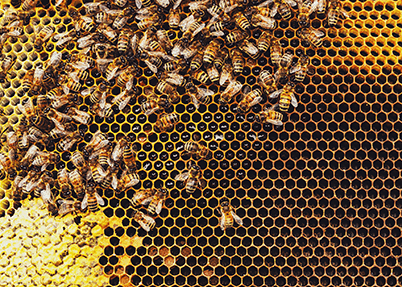
UNC-TV Shows NCBiotech Bee Health Grant Work at UNCG

Half of U.S. honeybee colonies have been wiped out in the last decade, which worries many in agriculture since a third of our food relies on honeybee fertilization.
Now, researchers at the University of North Carolina Greensboro are zeroing in on a way to help honeybees fight one of the major causes of hive collapse.
While several factors appear to contribute to honeybee hive collapse, including pesticides, climate change, and loss of habitat, infestation by varroa mites is a primary cause, says UNCG biology professor Olav Rueppell, Ph.D.
Rueppell and his lab are working to find a cost-effective, environmentally friendly, nontoxic way to combat the mites, funded in part by a $68,627 North Carolina Biotechnology Center Technology Enhancement Grant.
A video overview of the work, now posted on the UNC-TV website, will also air on UNC-TV Wednesday.
In the video, one blueberry farmer in Bladen County notes he rents thousands of bees every spring. Farmers do that, Rueppell said, not only because the bees are necessary for fertilization, but they also increase the yield and quality of a crop.
The researchers are testing a way to boost the natural defenses bees use to fight the mites, which burrow into the hive cells with honeybee larvae and proliferate exponentially when the bee emerges. Just a few of the mites, which can also infect the hive with viruses, can lead to hive collapse.
Practicing hygienic behavior

In a natural defense mechanism, nursing bees, sensing a chemical signal emitted by the mites, open the cells and yank out the mite larvae. It’s called hygienic behavior.
The UNCG researchers have synthesized the signaling chemical and tests show it increases the search-and-destroy behavior of the nursing bees. The UNCG researchers hope to develop it commercially over the next two years or so.
Rueppell said Kaira Wagoner, a UNCG post-doctoral student, has been working with him on the research program along with several other students for four years.
Mitey smart critters
In an interview with NCBiotech, Rueppell said one reason it’s important to think about helping bees help themselves is that the varroa mites are already developing resistance to pesticides farmers use to combat them. And in addition, pesticides can contaminate the product and the environment and hurt the bees, he added.
“So pesticides are not a long-term sustainable solution. Practical solutions have to work in the long term and this is a promising avenue.”
“Plans over the next two or three years are to expand from the little lab study here and extend it to a collaborator in Minnesota for independent verification. There is still a question of how to deliver it. We have the active ingredient but are not at the product development stage yet.”
At the beginning of the research, Rueppell said, “We reached out to a few companies,” including Bayer, which has its own honeybee research facility in the Triangle. “They said it was a little early and they might be interested later. We may have to revisit them.”
For himself, Rueppell said, the research has added benefits. “I like to see a good combination of intellectually stimulating basic research that has a practical application and in this case, we found that.”
